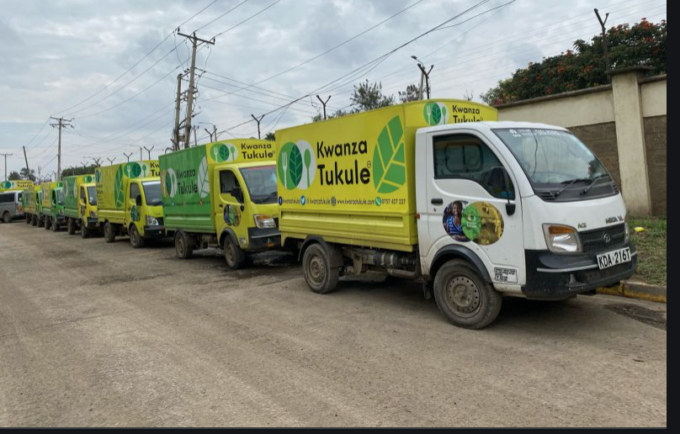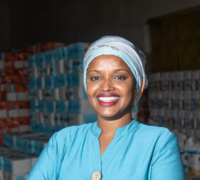Founded in 2018, Kwanza Tukule originally started by pre-boiling raw food such as lentils and pulses, which take a long time to cook, and then supplying them to vendors. They have since shifted to supplying food staples, addressing their customers’ needs by delivering daily, allowing them to pay as they go, and taking small orders, since many vendors lack storage.
“It’s not like a shop,” Mohamed-Churchill explained. “Sometimes it’s just under a tree, sometimes it’s behind a building.” The reliability, convenience, and regularity of the service eliminates guesswork for their customers and saves them time and money since they no longer have to get up early to take a motorcycle taxi to the store.”
To earn customer loyalty, Kwanza Tukule also provides employment. “Whenever we have recruitment […] we ask our customers, ‘Do you have anyone looking for work?’ And then we employ in the areas they live, because then they don’t spend a lot of money on transportation, they know the local people and we get more loyalty that way,” she said.
Technology also helps a great deal. Customers pay and order via an app, allowing Kwanza Tukule to consolidate orders and plan its delivery routes. The app also helps the company to manage its stock, predict supply and demand, and ensure suppliers are paid on time.
Building a social enterprise is not without its struggles. One of the biggest challenges has been hiring a committed team when she can’t offer them high salaries or a fancy office with computers.
“Initially, you don’t have too much you can offer, so you have to work harder to paint the picture of what the future could be like […] It’s time consuming!” Mohamed-Churchill explained.
Through a mix of trial-and-error, she has learned to find out what motivates people and recognizes that this might be different to what motivates her. “But it’s crucial that you have people who are committed in the beginning, or at least get rid of the people who aren’t […] because the commitment is what drives you through the start.”
The child of a shopkeeper, entrepreneurship was a natural path for Mohamed-Churchill. “In class, if I was asked a mathematics question, maybe I’d struggle. But if the teacher used an example of buying a banana and then selling it, and asked, ‘What’s the profit?’ I would be first with my hands up,” she recalled.
Reflecting on her approach to running a social enterprise, Mohamed-Churchill says she has a laser focus on customers. Every day she checks in with her chief operating officer to see how the company is performing with existing customers and how many new customers they are adding. Her second strategic priority is to keep track of suppliers, many of whom are grateful that she is catering for a demographic they hitherto have been unable to reach. The rest of her day is punctuated by calls to the sales team and investors.
With plans for Kwanza Tukele to expand to other cities in Kenya and Africa, Mohamed-Churchill anticipates that her daily work pattern will increasingly shift away from day-to-day operations to becoming more of a visionary leader, focusing on acquiring strategic partners and developing a model that can be rolled out in different locations.
YouTube




 Podcast available
Podcast available